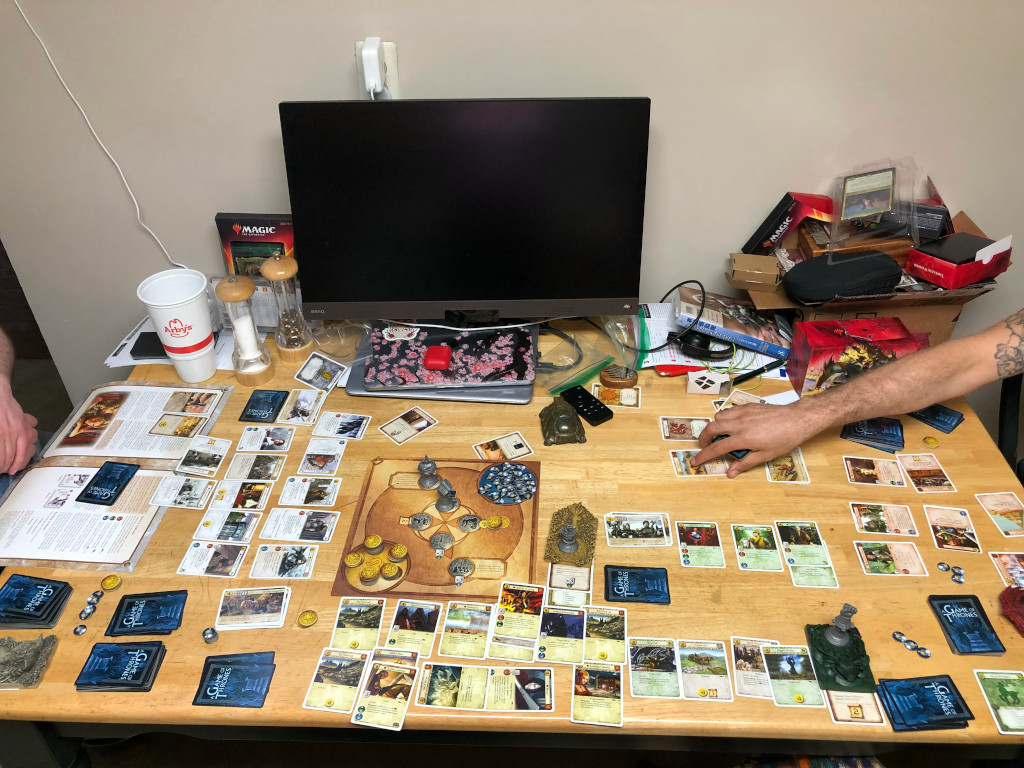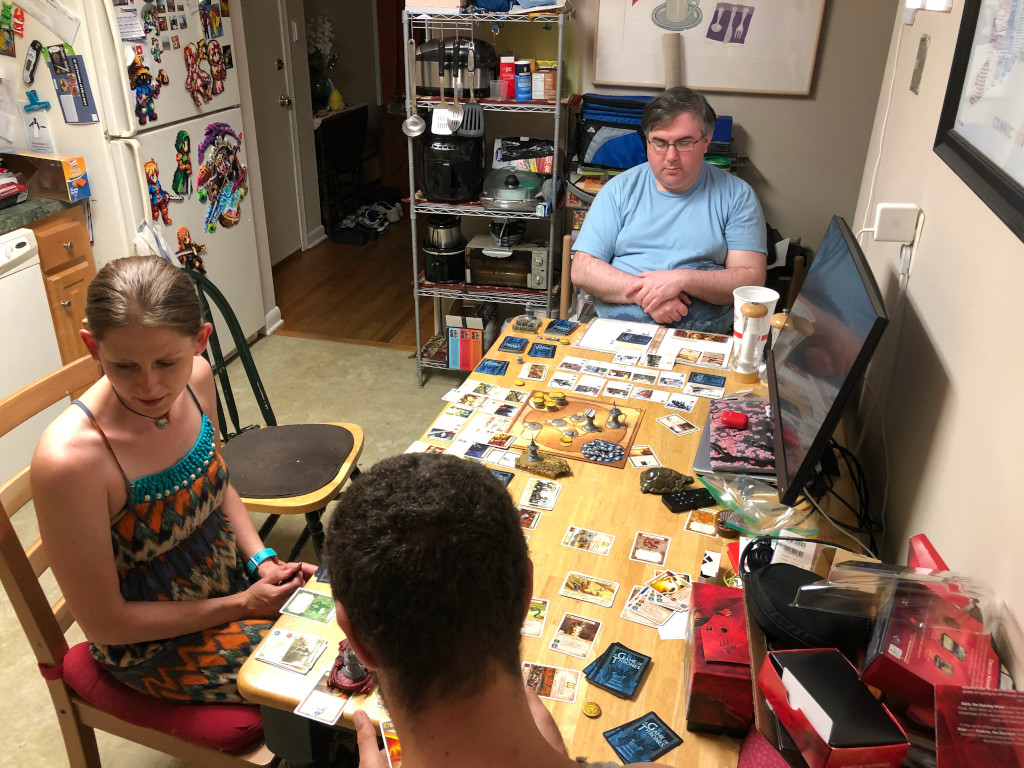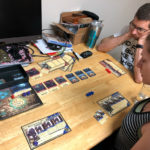Last year for my birthday, Kasul got me a huge, mysteriously heavy box and refused to say what was inside. Anticipation was killing me. When my birthday came, I opened it up and it was absolutely full of Fantasy Flight Games’ Game of Thrones, the Card Game stuff. The base game, custom card holders for each noble house, every expansion, box after box of stuff.
It was more than a little overwhelming. We were, at the time, working our way through the Gloomhaven main campaign and didn’t have time for new games. Just after we finished with Gloomhaven, the pandemic happened, crushing our family game night for months.
I’d taken the game out of its box and taken a look. It’s a deck building game similar to the Lord of the Rings: the Card Game, also published by Fantasy Flight Games, though very different in a lot of major ways.
Each player chooses one of the books’ major noble houses — the steadfast Stark, the upstart Baratheon, the usurious Lannister, or the murderous Targaryen. They then build a deck comprised of heroes, lesser characters, events and equipment, and a second deck of plot complications. The players take turns writing their own stories upon the bloody soil of Westeros.

Each round starts with everyone playing their plot cards. These cards show the income you will receive for the round, as well as any effects — you might get to tap or destroy a hero card, or might declare the treasury closed so that nobody gets money this turn, or you might be forced to ally with another noble house for this round, and so on.
The plot cards determine the initiative, and based on that, each player chooses a title from the central board. Master of Coin gets two extra gold for the round. Master of Whispers gains advantage in intrigue challenges. Master of Law draws an extra card, and so on.
Once the titles are chosen, players draw two cards (or three, if they are the Master of Law), and then, in turn order, spend gold to play cards from their hand.
The challenge phase follows. Again in turn order, the players can launch combat, power, or intrigue attacks against their enemies. Winning a challenge earns you power (and in the case of a power attack, some of the challenge loser’s power as well).
Play continues until someone has fifteen power, at which point they win the game.
I played as the Lannisters, a highly respected House that is responsible for much of the prosperity the other great Houses take for granted. I’d played Tywin Lannister in my starting hand. Baratheon’s first plot card allowed her to instantly kill any hero, and she chose to assassinate dear, innocent Tywin. Stark was over there, feeling his neck, surprised to find his head still attached, while Targaryen laughed with maniacal joy.
The hunt was on.
The loss of one of my key heroes early on was devastating, but I used the Lannister natural strengths with gold (since we owned gold mines, giving us some extra income) and with intrigue to weaken enemy attacks against me. During the game, I’d even find myself in a shaky alliance with the Baratheons as the Targaryans summoned their fell dracanic beasts to the land. The Stark strength in combat, though, eventually gave them the win. We’d allied against the Targaryans, but in the end Stark didn’t need Lannister help to sit on the Iron Throne.
The game differs from the Lord of the Rings card game in a lot of different ways. Instead of basing your deck around three heroes, you eventually end up with a horde. Players don’t cooperate against the common evil of Sauron; the players are in conflict with each other, and their is no external driving force. Each player has their own storyline instead of sharing them.
Once we were up to speed, things moved fairly quickly. It took about three hours to get through the game, though this will definitely improve when we play again. The various titles you take on each round combine with the natural strengths of your House in interesting ways. I’d started out well behind because of the early loss of Tywin Lannister. (I kept bringing that up throughout the game, even playing the Rains of Castemere on my phone during the Baratheon turn).
By choosing the Master of Coin where I could, combined with the natural Lannister gold advantage, I was able to buy myself back into the game. I used various event cards to blunt enemy attacks and generally made myself a difficult target while using intrigue to undermine enemy forces, for instance, by forcing them to tap their most powerful heroes, or use stealth to infiltrate through their defenses.
Game of Thrones: the Card Game is a surprisingly fun and sometimes deadly variant on the deck building game genre. It’s quite dependent on people building their own decks with expansions and such. We used the pre-built decks that came with the set, but serious players buy expansion packs and use them to craft their own strategies. That seems unlikely with our game group, but we’ll see.
Worth playing, though, if you ever have a chance. If you’d like to play a similar deck building game by your lonesome, Humble Bundle recently had a sale on digital versions of tabletop games. I picked up Asmodee’s The Lord of the Rings: the Card Game: the Video Game for cheap along with a few other games (including the digital version of Scythe, a popular game with our gaming group).
I spent a long weekend with the LotR digital card game and got a general feel for the mechanics. The Game of Thrones card game is significantly different, but the strategies are much the same. Play cautiously. Keep your defenses strong. Hold back your power for the right opportunity to strike. And don’t use all your best attacks when there are still three other players left to chip away at your now defenseless army 


Well written, and interesting game. I’m not a GoT fan, but card games that have this kind of flair always intrigue me, whenever the malls open up here again, I’ll have to visit the game shop there and take a look!
If you’re not a Game of Thrones fan, you might want to check out the Lord of the Rings card game instead — they are both broadly similar deck building games. The main difference is in one you work cooperatively, and in the other you work against each other.